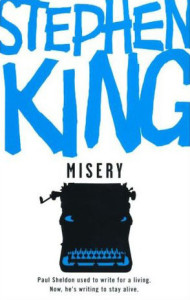 “As always, the blessed relief of starting, a feeling that was like falling into a hole filled with bright light. As always, the glum knowledge that he would not write as well as he wanted to write. As always the terror of not being able to finish, of accelerating into a brick wall. As always, the marvelous joyful nervy feeling of journey begun.”
“As always, the blessed relief of starting, a feeling that was like falling into a hole filled with bright light. As always, the glum knowledge that he would not write as well as he wanted to write. As always the terror of not being able to finish, of accelerating into a brick wall. As always, the marvelous joyful nervy feeling of journey begun.”
“But characters in stories DO NOT just slip away! God takes us when He thinks it’s time and a writer is God to the people in a story. He made them up just like God made us up and no one can get hold of God to make him explain, all right, okay, but as far as Misery goes, I’ll tell you one thing, you dirty bird, I’ll tell you that God just happens to have a couple of broken legs and God just happens to be in MY house eating MY food.”
Misery is my tenth book by Stephen King, and he’s written approximately ten bajillion books and novellas and short stories. In a way I’m sort of glad I never read Stephen King when I was younger, because now I have a whole mess of Stephen King books to experience for the first time and enjoy. And I enjoyed Misery very much. Just from growing up in the ’90s, I was familiar with the general story, but I always assumed it was only a scary story about a writer being held captive by his number one fan, who was crazy and evil or something. And that is what it’s about, but it’s also so much more complex than that.
Paul Sheldon is a successful novelist, the bestselling author of the Misery Chastain novels, a series of historical romantic melodramas that are ridiculously popular, much to their creator’s dismay. The Misery novels have made Paul famous, but they make him feel creatively bankrupt, like a sellout. A hack. He wants to write something else for a change. He knows he will never be taken as seriously as some authors, but not feeling beholden to Misery would be a nice change . . . so he kills her. With pleasure. With laughter. Fast forward to the publication of that last Misery book, Misery’s Child. Paul has been tucked away in a Denver hotel working on a new novel, Fast Cars. He’s just finished, considers it maybe his best book yet, and has celebrated with a bottle of champagne and a drive on the freeway. Only a storm comes on, and the next thing he knows he’s waking up in a fog of pain in a strange bed with a strange woman breathing foul, life-saving air into his lungs, and two shattered legs. The woman turns out to be Annie Wilkes, who describes herself as his number one fan.
Within a short period of time, Paul quickly ascertains that Annie is not sane. She is smart, certainly, but is also manic-depressive, controlling, and above all, psychotic. A former nurse, Annie traps Paul in every way possibly: physically, emotionally, pharmaceutically. They soon develop a toxic relationship, Paul learning how to gauge Annie’s moods, trying to make the best out of a horrible situation. A situation which is made worse, by the way, when Annie reads the new Misery book and FLIPS HER SHIT when she learns Paul has killed her beloved Misery. Paul then becomes a sort of modern day Sheherazade, telling a story to save his life. And not just to placate Annie, either. The new Misery book, in which he must resurrect his own murdered creation (fittingly called Misery’s Return) becomes an escape for him as well, a way to bear his captivity and pain as he and Annie rocket towards a final inevitable confrontation.
Annie is a brilliant creation. She’s scary, smart, driven, terrifyingly specific, and ultimately even in her psychosis and acts of criminal insanity, relatable. You pity her even as you fear her, and the toxic relationship she and Paul build, at first built on him trying to butter her up, eventually evolves to a place of mutual understanding that is equal parts horrifying and satisfying.
Along with this escalating and extremely dysfunctional fan/author, nurse/patient, captor/victim dynamic between Paul and Annie, the book has a running undercurrent concerning stories and creativity and what it’s like to be a writer. These parts were absolutely fascinating for me, and were made more so when Wikipedia informed me after the fact that this book was partly inspired by King’s own frustration at his reader’s seeming rejection of The Eyes of the Dragon, his first non-horror book, and one of which he was extremely proud. (P.S. I love that book.) He felt pigeonholed as a horror writer, and he was also struggling with his own drug and alcohol addiction at the time, of which both Annie and Paul’s addiction to Novrol are evidence. Neither of these facts are necessary to enjoy the book, but they deepened my appreciation for it.
All in all, this is a great novel, probably made better by Lindsay Crouse’s narration for the audiobook. I will be seeking out a print copy ASAP, because I know this cockadoodie book is one I’ll want to return to over and over.
